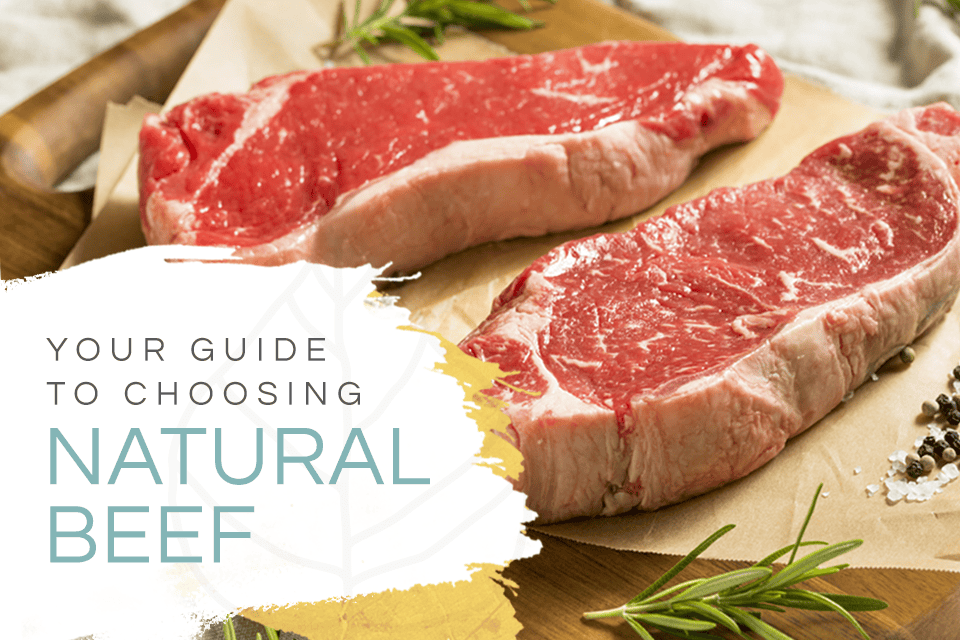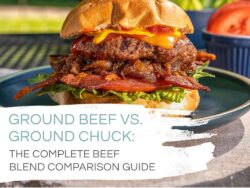
Hormone-Free, Antibiotic-Free, Natural … What Do These Beef Labels Mean?
Feb 21, 2020 | Natural Angus Beef
You’re at the meat case in the grocery store looking for beef to recreate that trendy recipe or make your favorite family meal. You find several options: natural, all-natural, naturally raised, organic, hormone-free, antibiotic-free, grass fed …
With all the labels out there, it can be challenging to keep them straight. Here’s what you should know when you’re choosing between them.
“Natural beef” doesn’t always mean the same thing.
Varying animal raising practices are part of the reason for meat label confusion. Some claims, such as “Certified Organic” or “Raised Without Antibiotics” require additional documentation or even third-party verification to confirm products meet the standards.
What is Natural Beef?
The USDA defines natural beef as beef that contains no artificial ingredients and is minimally processed (processed in a way that does not significantly alter the product). Beef producers are required to include a statement explaining what “natural” means on the label.
That means the definition of “natural beef” will vary based on the standards of individual brands. Some brands, for example, will take additional measures to ensure their beef is natural, such as raising cattle without antibiotics or added hormones. So be sure to clarify when you see labels stating “100% natural,” “naturally raised,” or “all natural beef.”
Natural Angus beef is different than grass fed beef.
Since natural and grass fed cattle are sometimes raised using similar practices, it’s easy to confuse the two. However, while both types of beef may be pasture-raised, the difference is in what cattle eat throughout their lifecycle. Natural cattle can be grain or grass fed, while grass fed cattle must eat grass and forages at some point in their lives.
Learn more about the difference between grass fed beef and grass finished beef.
Natural Angus beef is also different than certified organic.
“Certified organic” applies to both living conditions and what cattle are fed. Beef products must be third-party validated and meet the following requirements to receive the organic certification:
- Be raised in living conditions that allow for natural behaviors (like the ability to graze on pasture)
- Be fed 100% organic feed and forage
- Should not receive antibiotics or added hormones
Natural beef and certified organic beef thus have similar qualities, but whether natural beef meets the above standards depends on the producer. Some producers may not utilize pasture-raising or might administer antibiotics or hormones to their cattle. That’s why you’ll want to research how natural beef producers define what makes their beef natural.
What to Look for in Natural Angus Beef
Since definitions of “natural beef” can vary so widely, you should seek out beef producers that promote a truly natural product—one sourced from cattle raised naturally.
Look for natural beef produced to the following standards:
- No antibiotics: no antibiotics are administered to cattle (sometimes referred to as “antibiotic free beef” or “ABF meat”)
- No added hormones: no growth hormones are used in the raising of cattle (Note that “hormone free beef” is a common term but technically incorrect)
- Pasture-raised/naturally raised: Cattle are raised with access to pastures in an environment that allows them to mature naturally
Quality natural Angus beef producers will also only source cattle with verified Angus genetics.
At Aspen Ridge® Natural Angus Beef, our cattle meet all of the above standards because we’re dedicated to producing premium, wholesome beef and being transparent with our customers.
Learn more about what sets Aspen Ridge Natural Angus Beef products apart or discover our mouthwatering natural Angus beef recipes for your next meal!



